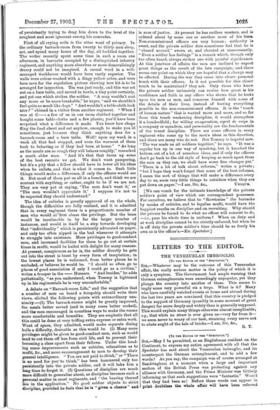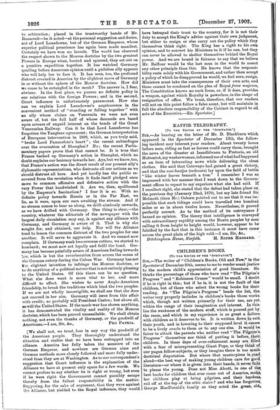[TO TR. EDITOR OP TES " SPROTATOR.1
Sin,—May I be permitted, as an Englishman resident on the Continent, to express my entire agreement with all that the Spectator has said about the Venezuelan imbroglio, and its counterpart the German entanglement, and to add a few words? As you say, the campaign was of course arranged at Sandringham at a moment when a large and important section of the British Press was protesting against any alliance with Germany, and the Prime Minister was blithely informing us that such suggestions were "fantastic." Would that they had been so! Before these words can appear in print doubtless the whole affair will have been referred to arbitration ; placed in the trustworthy hands of Mr.
Roosevelt—be it noted—at the personal suggestion and desire, not of Lord Lansdowne, but of the German Emperor, whose superior political prescience has again been made manifest.
Certainly we have won no laurels. The world has observed the respect shown to the Monroe doctrine by the two greatest Powers in Europe when, booted and spurred, they set out on a punitive expedition together. It has watched Germany quailing before American opinion until a guileless ally appears who will help her to face it. It has seen, too, the profound distrust created in America by the slightest move of Germany in or without the sphere of the Monroe doctrine. How did we come to be entangled in the mesh ? The answer is, I fear, obvious. In the first place, we pursue no definite policy in our relations with the foreign Powers ; and in the second, Court influence is unfortunately paramount. How else can we explain Lord Lansdowne's acquiescence in the convenient method of "standing or falling together" with
an ally whose claims on Venezuela we were not even
aware of, but the full half of whose demands are based upon arrears of unpaid interest on the bonds of the Great Venezuelan Railway. Can it be that Lord Lansdowne has forgotten the Yangtsze agreement; the German interpretation of European intervention in 1898, which, as you truly said,
"broke Lord Pauncefote's heart " ; the recent subterfuges over the evacuation of Shanghai ? No; the recent Parlia- mentary papers prove that that cannot be. It is true that France backed up Germany's action in Shanghai, which no doubt explains our leniency towards her. Aye, but we know, too, that France's action was the direct result of our present ally's diplomatic representations, who distrusts all our actions as we should distrust all hers. And yet hardly has the public re- covered from the revelation when it finds itself pledged once more to common offensive and defensive action with the very Power that hoodwinked it. Are we, then, spellbound by the Emperor's fascination ? I fear it is so. With no definite policy towards Russia or in the Far East, we lie, as it were, upon our oars awaiting the stream. And if no stream comes to bear us along, we drift aimlessly onwards, as we have drifted with Germany. One thing is clear,—the country, whatever the editorials of the newspaper with the largest daily circulation may say, is against any alliance with Germany, and Germany is aware of it. That is why she sought for, and obtained, our help. Nor will the Alliance tend to lessen the common distrust of the two peoples for one another. It will serve to aggravate it. And we cannot now complain. If Germany sunk two revenue cutters, we started to bombard; we must now act loyally and fulfil the bond. Ger- many has become painfully aware of American feeling towards laer, which is but the reverberation from across the ocean of the German outcry during the Cuban War. Germany has not tie slightest intention to infringe the Monroe doctrine, or to do anything of a political nature that is not entirely pleasing to the United States. Of this there can be no question. What e.'le does want is more vital to her, and more difficult to effect. She wishes to sever Anglo-American friendship, to break the traditions which bind the two peoples. If we are not wholly incorrigible, we shall see that she does not succeed in her aim. Germany will issue from this affair with credit ; so probably will President Castro; but above all, so will the United States. If the mock-war has shown anything, it has demonstrated the vitality and reality of the Monroe doctrine, which has been proved unassailable. We shall obtain nothing, not even the thanks of Germany, or the goodwill of
[We shall not, we trust, lose in any way the goodwill of the American people. They thoroughly understand the situation and realise that we have been entrapped into an alliance. America has fully taken the measure of the German Emperor, and nowhere are German aims and German methods more closely followed and more fully under- stood than they are at Washington. As to our correspondent's suggestion that Court influence is the explanation of the Alliance we have at present only space for a few words. We cannot profess to say whether he is right or wrong, but even if he were right the Government cannot possibly escape thereby from the fullest responsibility in the matter. Supposing, for the sake of argument, that they were against the Alliance, but yielded to the Royal influence, they would, have betrayed their trust to the country, for it is not their duty to accept the King's advice against their own judgment, but either to resign or else carry out the policy which they themselves think right. The King has a right to his own opinion, and to convert his Ministers to it if he can, but they can never be allowed to shelter themselves behind the Royal power. And we are bound in fairness to say that we believe Mr. Balfour would be the last man in the world to assert any other principle than this. He knows that the responsi- bility rests solely with his Government, and rather than accept a policy of which he disapproved he would, we feel sure, resign. Ministers must take the consequences of their own acts, and these cannot be condoned on the plea of Royal force majeure. The Constitution knows no such force, or, if it does, provides a weapon, against which Royalty is powerless, in the shape of resignation of office. We trust, therefore, that our readers will not on this point follow a false scent, but will maintain in full the absolute responsibility of the Cabinet in regard to all acts of the Executive.—En. Spectator.]







































 Previous page
Previous page